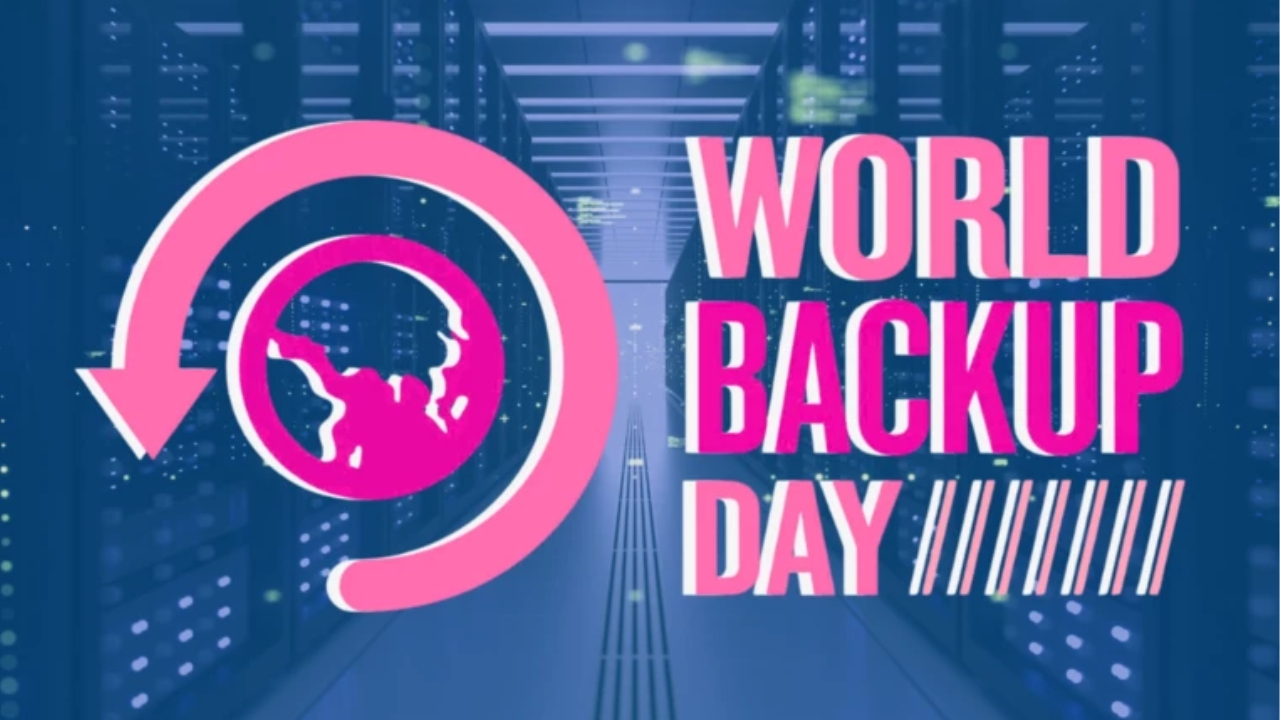
We’ve all been there. You're working on an important presentation for a big client, and suddenly your computer crashes. The panic sets in as you realize you haven't saved your work in a while. You've just lost hours of work.
This scenario might seem like a problem of the pre-cloud era, but it’s actually more common today than you might think. Why? Because too many of us aren't backing up our data.
21% of people have reportedly never made a backup, and a recent survey found that a whopping 2 out of 3 UK companies have lost data due to failed backups.
Despite the clear risk, experts in the field warn many organizations still struggle to understand the importance of backing up data, even with the recent surge in data theft and challenges created by hybrid working.
With the backdrop of World Backup Day on March 31st, we spoke to several data experts about why World Backup Day is still crucial in 2024, and how organizations can keep their data secure in the era of cloud, AI, and machine learning.
What is World Backup Day?
World Backup Day is an annual event celebrated by the tech community on March 31st to remind individuals and organizations alike of the importance of backing up data to prevent data loss.
Launched in 2011 by a group of tech professionals on Reddit, it has grown into a global initiative that urges individuals and businesses alike to take proactive steps in protecting their valuable and sensitive data.
Data loss can occur due to a variety of unforeseen circumstances – hardware failures, accidental deletions, cyberattacks, and natural disasters – all capable of erasing years of irreplaceable information.

There are different ways to back up your data, including:
- External Hard Drives: A popular and cost-effective option, external hard drives provide a physical copy of your data stored offline. They're readily available and easy to use. However, they're susceptible to physical damage and theft.
- Cloud Storage: Backup as a service (BaaS) offers a convenient way to store your data remotely on secure servers. services often operate on an automatic schedule, ensuring your information is always up-to-date.
- Network Attached Storage (NAS): NAS devices are dedicated network storage solutions that provide a centralized location for backing up multiple devices in a local network. They offer a balance between convenience and security but require some technical know-how for set-up.
Why back up your data?
Data loss can happen to anyone, at any time, and for a variety of reasons. Whether it’s accidental deletion, power surges, or even natural disasters, they can all lead to the loss of data. Backups provide a safety net to these risks – a copy of your information readily available to restore in case the original is compromised.
Not only that, backups are the first step in protecting your data from a range of risks you may not even be aware of.
“Think back to the first time that you lost data because you forgot to hit ‘save.’ All of the work that you’d done since your last save was lost, said Josh Stephens, the CTO at BackBox.
“Now imagine that problem at the enterprise scale, with today’s ultra-fast networks and processors and the amount of data that we create every second. In my opinion. World Backup Day isn’t just still important. It’s even more important than ever.
“Backups provide a sense of security and confidence to businesses and individuals, knowing that their data is securely stored and can be restored when needed,” Scott Tucker, Consultant at ThreeTwoFour, told EM360Tech.
“VEEAM’s 2023 Ransomware Trends report indicated that in 93% of ransomware incidents, the threat actors targeted the backup repositories. This trend poses a significant challenge to traditional backup strategies, as organizations may no longer rely solely on backups for data recovery in the event of an attack.
“However, while this threat highlights the need for enhanced security measures and backup solutions, it does not diminish the overall importance of backups.
“Rather, it emphasizes the necessity of implementing robust backup practices that incorporate multiple layers of security, such as immutable backups, strong access controls, offline backups, encryption, and regular integrity checks,” added Tucker.
The importance of world backup day in 2024
Backing up data might seem like a topic for 10 years ago, especially given recent advancements in AI and machine learning which have transformed the tech world over the past few years.
But according to the experts we spoke to, the reality is that the rise of these new technologies has only made backups more important than ever before, and many people don’t realize how important backing up data has become.
“For most people, there’s a simple reality: backup is boring,” said Kevin Cole, director of Product and Technical Marketing, data protection at Zerto.
He has a point. Backups have existed for decades, and with the wealth of new, exciting, and innovative technologies hitting the front pages every day, it’s difficult to feel any enthusiasm for this tech dinosaur – never mind celebrate it for World Backup Day.
“Yet," Cole continues, backup remains more relevant than ever thanks to the explosive growth in data, distributed from edge to cloud, and an ever-evolving cyber threat landscape.”
This World Backup Day, make it a priority to double-check your backup plans and ensure end-to-end protection across the data lifecycle. It may not have the headline-grabbing power of IT’s latest bleeding edge innovations, but backup is one of the most critical tools in any organization’s efforts to minimize data loss and take control of the data deluge.
“Backing up data has been a necessity for decades for organizations to keep their data safe and recoverable,” considers Tim Sherbak, Product Marketing at Quantum. But with the development of technologies such as AI, the data in those backups has never been more valuable.
Sherbak explains: “Training an AI model to complete a task successfully relies on the quantity, quality, and variety of the data given as input. The more robust the dataset, the better the model will be able to detect specific patterns of interest and generate meaningful content.
“Organisations need to be confident that they can restore their data in the event of a cyber-attack or natural disaster. Having a rock-solid data protection strategy and a tried and tested disaster recovery plan are essential. With increasing regulations and corporate recognition of inherent risk around the use of AI, retaining model training and input data is also non-negotiable for documenting solutions, explaining the models and their outcomes, complying with internal policies, and mitigating legal risks.”
Neil Jones, Director of Cybersecurity Evangelism at Egnyte, agreed, telling EM360 that World Backup day is crucial to reminding organizations that data protection is only as good as your level of cybersecurity preparedness.
With more than $1 billion paid in global ransom payments in 2023, data backups have become mission-critical as organizations seek to recover from ransomware attacks (and other debilitating cyberattacks) in days or hours rather than weeks or months," commented Jones.
"The best advice I can offer is that organizations must take their Incident Response (IR) programs seriously, and a viable Business Continuity and Disaster Recovery plan needs to be a vital component of that larger IR program. In the event of a significant cyber attack, users can’t stay productive without just-in-time access to their data, and even minutes or hours of data interruption can have a major impact on employees’ productivity and a company’s bottom line."
Read: Top 10 Biggest Cyber Attacks in History
"In addition to protecting themselves against cyberattacks, companies struggle to manage the vast amounts of data they generate in today’s AI-driven work environment while adapting to global data privacy regulations that are changing frequently. As a result, it is extremely important to test your company’s backup environment regularly before a potential cyber attack, technical malfunction, or employee error that could make your data inaccessible."
How to securely back up your data
If backups are still necessary, then we must ensure they are fit for purpose for today’s modern challenges. In particular, IT teams must consider the safety of their backups when storing data in the cloud.
Terry Storrar, Managing Director at Leaseweb UK notes how “Approximately 89% of companies are currently utilizing a multi-cloud approach and 97% of IT leaders have the intention to expand their cloud systems.
“Of all the different services available through the cloud, cloud backup is arguably the most popular. This is understandable when considering the benefits of the simplicity and scale of cloud computing and it’s certainly something that provides tremendous benefit to organisations. However, not every cloud backup solution is created equal.”
Myles Currie, Product Manager – End User Compute at Six Degrees adds: “If your organization is transitioning workloads to the public cloud, you may well have concerns around losing control of your data. These aren’t unfounded – SaaS providers take backups to ensure the integrity of their services, but they will not take responsibility for data loss that results from accidental deletion, malware, or operational errors.”
Leaseweb UK’s Storrar agrees, and he encouraged organizations to choose “a trusted cloud hosting provider that offers comprehensive expertise, 24/7 support, and robust disaster recovery solutions.
“From the data center providers’ point of view, they need to take every necessary precaution to ensure that customers’ data is available around the clock, along with comprehensive backup. This includes the availability of emergency backup services, such as batteries and generators, in case of power outages. In the event of a disaster, it’s important to keep in mind that a proactive backup plan to ensure business continuity always has multiple moving parts to consider; having the right providers and products in place helps ensure these parts work in concert if disaster strikes.”
Darren Thomson, Field CTO EMEAI at Commvault, highlights that “traditional approaches to data protection have been seen to fall short as businesses try to recover from cyber attacks” where malware has been inserted into the backups, meaning that “when organizations prepare to recover from the attack, they are stuck in a vicious cycle of restoring the virus, and often the criminal's original access, making it almost impossible for them to recover successfully and leaving them little choice but to pay the ransom.”
Thomson agrees that “backups remain critical”, but argues that the focus must be on clean backups, which rely on anomaly detection and early warning systems. He explains that “clean backups are only useful if you have a clean environment to recover into. In addition, a recovery plan that is not tested is no recovery plan at all! The issue is that properly testing and recovering to a clean environment (a “cleanroom”) has historically been very expensive and complex.
"Now, utilizing the power of the cloud and AI, this is possible at a low cost and in a scalable manner. It is ultimately all about cyber resilience – being able to withstand attacks and continue operations even when the worst happens.”
According to these seven experts, it seems clear that backups are very much still relevant today; in fact, organizations cannot exist without them, or else risk losing everything.
I'd like to finish with some concluding remarks by Zerto’s Cole: “World Backup Day is a welcome chance to remind ourselves of the importance of protecting our data and ensuring its availability," Cole added.
“As the old saying goes: the best time to put in place a modern data protection strategy was yesterday; the second-best time is today.”












